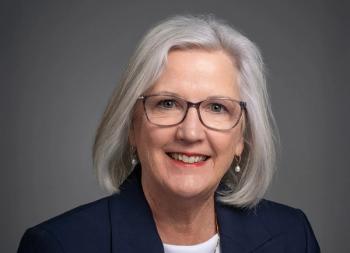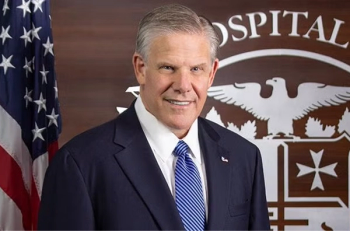
Futurist Amy Webb warns of seismic changes ahead for hospitals | AHA Leadership Summit

Leaders have more ability to innovate than they realize, Webb says, but health system executives must think differently.
Seattle - Amy Webb warned the audience of healthcare leaders that she was going to scare them a bit.
The well-known futurist almost certainly succeeded, at least a little.
However, she also offered some reasons for hope during her presentation Sunday at the
“You have more direct and indirect control on your futures than you realize,” Webb told the audience. “I actually think you have more power to innovate than you realize.”
Speaking to an audience of more than 1,200 healthcare leaders, Webb offered glimpses of some radical developments in the coming years that pose threats to the healthcare industry. Webb is the founder and CEO of the Future Today Institute, and she’s a professor at the New York University Stern School of Business.
Webb didn’t pull punches in outlining some disturbing trends the healthcare industry needs to recognize. She pointed out that 10 years ago, one in five young people envisioned themselves working in healthcare, whether as a doctor or some other role.
“Guess what the situation is today,” Webb said. “Today, one out of every three kids wants to be an influencer.” The rest want to be an astronaut, professional athlete or a teacher, she said.
“I have bad news for you all … You don't even register. You're not even showing up in the data anymore,” Webb said.
At a time when health systems continue to face
She also told the audience, “I don’t think it’s your fault.” But with the rise of technology, including ubiquitous smartphones and social media, Webb said, “It’s changing how kids relate to the world.”
Webb warned the audience that they would grow increasingly uncomfortable with some looming threats, humorously using the “pain scale” that is a fixture in healthcare.
She also said hospitals aren’t spending enough time and thought in understanding trends outside of healthcare.
“My observation is that there are some fundamentals that are missing,” Webb said. “Yes, you are focused on strategy, but it's too near-term. You’re doing strategy without strategic foresight.”
To illustrate the coming changes in healthcare, she pointed to the development of high-tech and high-priced “smart” toilets (costing as much as $10,000) that can examine waste products and track health data, such as signs of infection.
While joking that one may not want to hear from a voice assistant in the bathroom, Webb suggested that these companies may be making groundbreaking moves that may only be seen in hindsight.
“My point is this: Consumers are now mining and collecting their own data with technology companies, and they are bypassing you,” Webb said. “They are threatening to bypass the healthcare industry.
“Toilets are just one of many, many new diagnostic tools. They are not available to everybody. But again, if you go forward in time, these data are so valuable to the big tech companies that the prices are going to come down so that everybody can afford them. So what if your bathroom is the new LabCorp or Quest? And what if big tech winds up commoditizing the medical field?”
Webb pointed to the recent partnership of Andreessen Horowitz, the venture capital firm, and Bassett Healthcare Network, a rural healthcare provider in New York state. She noted that the healthcare provider gains access to better technology, which may seem like a win-win.
But the venture capital firm is getting real-world applications in patient data, which could make it easier to build out its business model and gain entry into healthcare systems.
Eventually, Webb says it’s possible that hospitals and health systems will have fewer value-added activities that only they can provide to their communities.
“What I see today is that hospitals run the risk of becoming more disintermediated, as healthcare becomes more commoditized … this is why if you don't change what you're doing going forward, I think this is where you start to lose control, unless you have a better long-term plan,” Webb said.
“If you're feeling constrained today, this is going to be very painful for you sometime in the next 10 years,” she added.
She also discussed the emerging role of generative AI, and said the real future of AI in healthcare may have less to do with medicine than transforming administration and operations.
“Imagine an AI-based coding system that can help automate the painstaking process of medical coding and billing,” Webb said.
Going forward, Webb said healthcare leaders are going to have to build “re-perception" skills.
“You're going to have to operationalize strategic foresight into your organization and it has to be woven into leadership and to management and to execution,” Webb said. “Because there are all of these opportunities on the horizon. The only way to get there is by sort of thinking long- and short-term simultaneously, and positioning ourselves to make better decisions.”
In conclusion, she said hospital executives must ask “what if,” so they don't have to say, “Now what?”
“We need the health of our hospitals to improve because that's ultimately what helps our communities improve, and I think there's a lot of things you could be doing today,” Webb said.






























